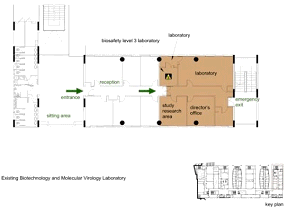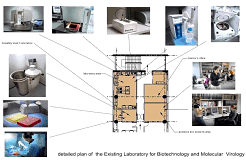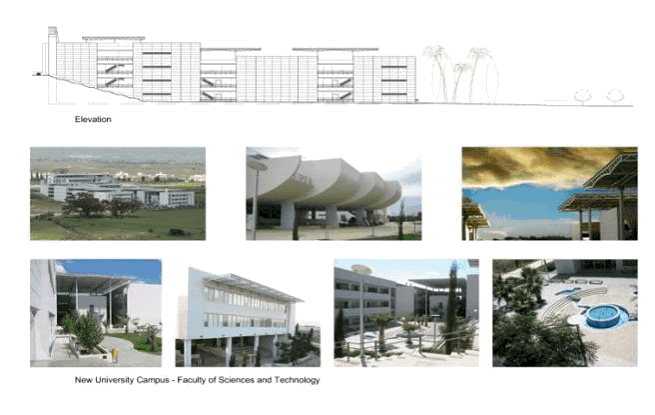Research Infrastructure (RI) Name: Department of Biological Sciences (University of Cyprus)
Website: https://www.ucy.ac.cy/biol/en/
Mission: The undergraduate and graduate programmes of the Department of Biological Sciences aim to provide students with high quality education at global standards, so that that can develop a deep understanding of their science and a versatile thinking, something critical for their professional career in the modern environment. Furthermore, the graduate and doctoral students can learn state-of-the-art laboratory experimental techniques and approaches that allow them access complex scientific problems and produce basic knowledge, equipping them in a way that enables them to meet the demands of modern research and contribute at a maximum level to the global scientific community.
Research Services provided: The Department of Biological Sciences consists of the following Laboratories:
1. Drosophila Infection and Carcinogenesis Laboratory
(Apidianakis Yiorgos, Assιstant Professor)
Main Equipment:
- Big Drosophila chambers, a microscopy room that includes Stereoscopes, Fluorescent Stereoscopes, a Fluorescent microscope and a confocal microscope and a molecular biology laboratory set up are necessary for our work.
2. Cancer Biology and Chemoprevention Research Laboratory
(Constantinou Andreas Professor)
Main Equipment:
- Four microcentrifuges
- One mid-range centrifuge
- Leica inverted microscope
- Leica upright fluorescent microscope with 4 filters for immunohistochemistry and other applications (i.e. comet assay)
- A sonicator, several horizontal and vertical gel electrophoresis apparatuses with low and high voltage power supplies, two thermocyclers, a PCR prep station, spectrophotometer, two refrigerators, four mini refrigerators, three mini freezers, one freezer, several shakers, UV transilluminator and UV-crosslinker, vacuum pumps, several water baths, water circulator, water purification system, pH meters, gel documentation and analysis system, nucleic acid analysis systems, heating blocks, imaging system (Labotal) and a BioRad Gene Pulsar II electroporator for cell transfection.
- Access to two common equipment areas: one in the same floor as the CBC lab and another in the upper floor.
- Lower level common equipment lab includes: Two autoclaves, one Guava EasyCyteTM flow cytometer, additional ultra-low temperature freezers, large scale incubator shakers and an additional water purification system.
- Upper level common equipment area includes: cryogenic refrigerator, one ultracentrifuge.
3. Laboratory of Molecular and Medical Genetics & Molecular Medicine Research Center
Main Equipment:
- Basic and more modern genetics facilities that include clinical refrigerated centrifuges and microcentrifuges, horizontal agarose and vertical polyacrylamide gel electrophoresis, including slab SDS-PAGE electrophoresis along with high voltage and regular power packs, several thermal cyclers including temperature gradient cyclers, a Real-Time PCR cycler, Applied Biosystems ViiA7, which allows processing of samples in 96-well or 384-well plates, in addition to SNP analysis and High Resolution Melting, several refrigerators, several 20 oC and eight -80 oC freezers for the Biobank, a DNA analyzer of Αpplied Βiosystems with 16 capillaries for Sanger DNA sequencing (ABI3130xl), and tissue culture facilities.
- Ion Torrent (Life Technologies) next generation sequencing platform (NGS), for high- throughput gene panel analysis.
4. Laboratory of Developmental Biology and Stem Cell
(Georgiades Pantelis, Associate Professor)
Main Equipment:
- PCR machine, nucleic acid quantification apparatus, electrophoresis apparatus etc.)
- A biosafety level-II hood, two CO2 incubators and an ultracentrifuge that are crucial for the stem cell/embryo culture and lentivirus work we do.
- Inverted Zeiss microscope with fluorescent and digital image capture capabilities that is indispensable for the imaging of stem cells and embryos (histology or wholemount views of RNA in situ hybridization and immunochemistry).
- Microtome, cryostat and a wax embedding station.
- Various stem cell lines are stored in a specialized container under liquid nitrogen.
5. Laboratory of Epigenetic Gene Regulation (Kirmizis Antonis, Associate Professor)
Main Equipment:
- High-throughput genetic screens, such as Synthetic Genetic Array, using a Robotics system (BM3-SC from S&P Robotics Inc.) for automated replication and imaging of yeast colonies
- A tetrad dissector from Singer Instruments Inc. (SporePlay)
- Various biochemical assays, such as Chromatin Immunoprecipitation, gene expression profiling, and affinity purifications which require the use of a Real-Time PCR machine (CFX-96 from BioRad), a shaking incubator (ISFX-1), a UV-Vis spectrophotometer (Nanodrop 200c from Thermo Scientific), an ultrasonic disintegrator (Bioruptor from Diagenode), a high-throughput electrophoresis system (E-page from Invitrogen), and a multispectral imaging system (Biospectrum from UVP)
- Laminar flow cabinet (Labcaire systems Ltd)
6. Behavioural Ecology & Evolution Laboratory
(Kirschel Αlexander, Assistant Professor)
The Laboratory focuses on the examination of how ecology, behavior and biogeography explain patterns of biodiversity.
7. Laboratory of Biotechnology and Molecular Virology (Leondios G. Kostrikis, Professor)
Main Equipment:
- Programmable thermal cyclers for polymerase chain reaction, agarose gel electrophoresis apparatuses, UV-VIS spectrophotometer, microcentrifuges and refrigerated table-top centrifuges, an image documentation system capable of storing images in a format appropriate for the computer-driven quantitative analysis of autoradiograph images, workstations, analytical balances, autoclave, biological safety cabinet class II, -80°C and -30°C freezers, water purification systems, biosafety and laminar-flow hoods, bacterial incubators/shakers, gamma counters, a real-time PCR fluorescence thermocycler (ABI model 7900HT) and an automated DNA sequencer (ABI Model 3130).



Figure: The Biotechnology and Molecular Virology Laboratory (BMV) at University of Cyprus. Upper left, side view of the building of the School of Pure and Applied Sciences and panoramic views of the University of Cyprus, campus. Upper Right, internal view of the BMV laboratory which is located at the 2nd floor, final wing of the School of Sciences building. Lower left, images of the equipment and personnel currently at the BMV laboratory
8. Molecular Ecology and Evolution Laboratory (Papadopoulou Anna, Assistant Professor)
Main Equipment:
- PCR machines, Qubit fluorometer for accurate quantification of DNA and RNA, Pippin Prep for DNA size selection, centrifuge, vortex, incubators, multichannel pipettes, magnetic plates etc.
- High quality stereoscopes and photographic equipment for specimen digitization and freezers for storing biological materials.
9. Drosophila Development and Homeostasis Laborator (Pitsouli Chrysoula, Assistant Professor)
Main Equipment which is shared with Yiorgos Apidianakis’s laboratory:
- 2 large insect incubators, dissecting stereoscopes, 1 fluorescent stereomicroscope, 1 fluorescent microscope, -20oC and -80oC freezers, electrophoresis apparatus, thermocycler, qPCR machine, Nanodrop spectrophotometer, incubator shaker and BL2 laminar flow cabinet.
- A Leica TCS SP2 AOBS DMIRE2 inverted confocal microscope equipped with 5 lasers for multispectral imaging.
10. Bioinformatics Research Laboratory (Promponas Vasilios, Assistant Professor)
Main Equipment:
- The BRL production servers and the BRL web server (troodos.biol.ucy.ac.cy) are located in the dedicated server room of the department.
11. Molecular Biology and Biochemistry Lab (Santama Niovi, Professor)
Main Equipment:
- PCR Peltier thermocyclers (including gradient and 96-well cyclers), units for sequencing gel electrophoresis, horizontal agarose gelelectrophoresis and slab SDS-PAGE protein electrophoresis, systems for electroporation of prokaryotic and eukaryotic cells and for electroblotting, a selection of centrifuges (floor to desktop), high voltage and regular power packs, one large-capacity bacterial culture incubator, several freezer units and other standard laboratory equipment
- Fully- equipped tissue culture facility and access to facilities such as modern animal house facilities, microinjection and FACS analysis equipment and additional electroporation systems. - Access to facilities such as a real-time PCR cyclers, DNA sequencers, pulse-field gel electrophoresis units, high-speed, vacuum and bench top refrigerated centrifuges, a digital gel imaging system with CCD camera for visualization of nucleic acid and protein gels, a fully equipped suite for radioactive work and a cold room.
- Light Microscopy Facility in a dedicated suite, adjacent to one of its main laboratory areas. The facility consists of a Carl Zeiss Axiovert 200M inverted fluorescence microscope with a motorized stage and Plan-Apochromatic lenses (x10, 20, 63 and 100), fully equipped for phase contrast, Differential Interference Contrast (DIC) and fluorescence microscopy (with a selection of filters to accommodate most widely used fluorochromes including far red). The microscope is linked to a C. Zeiss AxioCam HRc digital camera for multicolor brightfield acquisition, and an AxioCam MRm camera for high-sensitivity fluorescence acquisition. It is operated with a XEON 2.8GHz workstation, equipped with Zeiss Axiovision 4.6 software for image processing and electronic archiving. The microscope also incorporates modules for motorized multichannel fluorescence acquisition, a module for autofocus capability and the ApoTome module for optical sectioning, complete with the Inside 4D (3D plus time) Z-stack sectioning processing and visualization module. The high specialization of this microscope enables advanced high resolution microscopy in cell biological research.
12. Ecology and Biodiversity Laboratory (Sfenthourakis Spyros, Associate Professor)
Main Equipment:
- Good quality stereoscopes with photographic equipment, PCR machines and related apparatuses (electrophoreses, centrifuges etc.), freezers for storing biological material, various data loggers and other collecting material (traps, tubes, GPS, etc.) for field work, specialized software and respective dedicated computers (e.g., for GIS, modeling, ecological analyses etc.).
13. Cell and Developmental Biology Laboratory (Skourides Paris, Associate Professor)
The goal of the research group is to understand the cellular and molecular mechanisms involved in generating the three dimensional organization of tissues and the overall process by which the basic body plan of vertebrate embryos is established.
14. Tumour Viruses and Cancer Laboratory (Strati Katerina, Assιstant Professor)
Main Equipment:
- Fully equipped for standard molecular biology and biochemistry techniques and also mouse and cell culture work.
- Equipment in common facilities such as a mouse facility with individually ventilated cages (Allentown) where the mouse colony is maintained, as well as a cell culture facility where a BSL-2 tissue culture hood (Labcaire), routine cell culture microscope (Leica) and CO2 incubator (Binder) reside.
- Most miscrosopy needs are covered by an inverted microscope (Zeiss) equipped for phase-contrast, light and fluorescence microscopy.
15. Teaching laboratory
Main Equipment:
- Two chemical fume hoods, a water purification system, a refrigerated centrifuge, 15 basic stereoscopes, 5 benchtop centrifuges, a PCR machine, a shaking incubator, water baths and balances.
16. Common Equipment Laboratories
Main Equipment:
- The Common Equipment Laboratory (FST 02, B267) is a laboratory containing mainly common equipment used by several laboratories of the Department. Its main equipment is an autoclave machine, a lab washer, a refrigerated centrifuge, an ice-machine, 3 ultra-low temperature freezers (-80oC), 2 shaking incubators, various common incubators, various PCR machines and a few other pieces of small equipment. It also includes a robotic system for yeast cultures and a yeast dissection microscope, belonging to the Laboratory of Epigenetics.
- The Common Equipment Laboratory (042) is a laboratory containing mainly common equipment used by several laboratories of the Department. Its main equipment is a multi-function imaging system, a chemical fume hood, an autoclave machine, a cryostat, a refrigerated centrifuge, an ice-machine, 2 shaking incubators, various PCR machines and a few other pieces of small equipment.
- The cell culture room (FST 02, B173) is a common equipment laboratory used mainly by the research laboratories involved in cell culture techniques. It includes three biological hoods, 3 CO2 incubators and a refrigerated centrifuge, all used exclusively for cell cultures. It also includes some small freezers and refrigerators, a microscope, an image cytometer and a few other pieces of small equipment.
The equipment for robotics LegoWedo:
-Beebots, Bluebots, Probots, Tablets, various educational programs, robotics mats
LegoWeDo robotics kits:
- Bluebots, Probots, tablets, Various educational programs, Educational robotics mats
| Research Category: | Biological and Medical Sciences |
| RI Main Priorities: | - To develop competitive research programmes in the fields of immunology, cell biology, developmental biology, embryology, bioinformatics, genetics, epigenetics, virology, neurobiology, and cancer treatment and prevention, as well as in ecology and biodiversity, including the sustainable use of its components.
-To offer high quality education and training at the Undergraduate and Postgraduate level.
-To contribute to upgrading services provided by the public and private sectors in Cyprus, especially those concerning public health, the environment, and medicine. |
| Hosting Legal Entity: | Department of Biological Sciences
University of Cyprus
P.O. Box 20537 - 1678 Nicosia
CYPRUS
Telephone Number: +35722892894
Email Address: christou.anna@ucy.ac.cy |
Equipment of RI
(and its Labs if applicable) | For more information regarding the RI and its Laboratories, including equipment, please click the attachment below. |
| RI Contact Person: | Name: Constantinos Deltas
Title: Professor
Address: University Campus
FST 02 – Faculty of Pure and Applied Sciences
Telephone Number: +35722892882
Email Address: deltas@ucy.ac.cy |